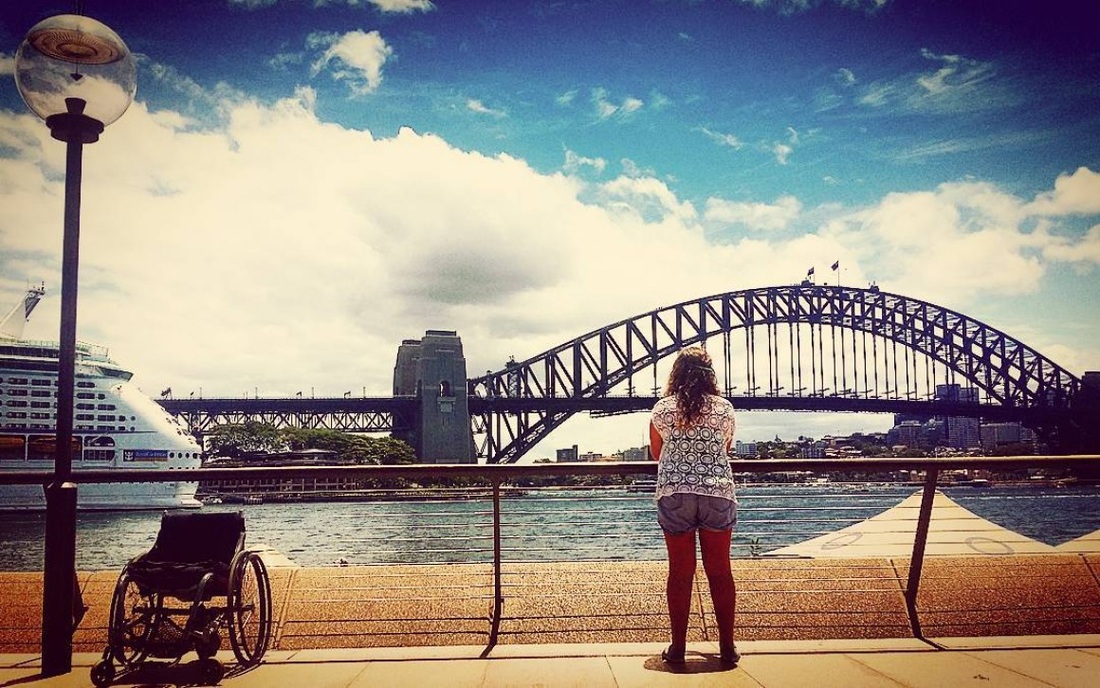|
ALEX HOLLAND Volume 9, Issue 2 Growing up I never felt disabled. I was born with cerebral palsy and when I was younger, I used to walk a lot more and run around with the other kids at primary school. My friends used to give me ‘head starts’ in races, I had certain ‘immunity spots’ in monkey-bar tiggy and if I fell over, someone would offer me a hand up and we’d keep playing. I wasn’t ‘disabled’. I never connected with the disabled community. Coming from a small country town in Victoria, there weren’t many opportunities other than sport to find people with similar experiences as myself. And if you have witnessed my hand-eye coordination, you would understand why sport wasn’t really an option for me.
I didn’t belong to the disabled community. In fact, in my dreams – I am never disabled. Which is quite astonishing considering I’ve been disabled since birth and I’ve never actually experienced walking ‘normally’, yet in my dreams I run, jump and nothing holds me back. But I am disabled. The first time I really accepted this was when I met Emily Rose Yates. My kindred spirit. My best friend. My partner in crime. Emily came on exchange from England and we met at St Mary’s College. She had the same disability as me, but unlike me, had pink hair, a body full of tattoos and an attitude towards disability I had never considered – uniqueness. Befriending Emily changed my life. I realised there are people in the world like me, with similar experiences as me and who could identify with me. I was not alone. Instead of shunning the disabled community, I should be embracing it. And now I am. But with a catch – I’m defying disability. Because even to this day, while I am aware I have a disability and identify as a part of the disabled community, I do things that neutralise the stigma. I travel to foreign countries and get astounded looks from airport staff when I tell them I’m ‘lap-packing’ by myself around Europe. I get odd looks from bouncers when I stand up and start climbing the stairs to a club when I’m informed all the alcohol is served upstairs. And I’m told I’m incredible when I tell people I’m studying law. I don’t deserve recognition for living my life – I’m doing what any ‘normal’ person would do. And in that respect I am defying disability because so many ‘normal’ people have this ridiculous misconception that disability stops you from living. It’s time we changed the attitude towards disability. I can do anything I put my mind to. I probably won’t attempt climbing the Sydney Harbour Bridge anytime soon but if I was given the chance – I’d bloody give it a crack! Being involved in the Disability Human Rights Clinic (DHRC) at Melbourne Law school last year made me realise something incredibly sad about myself – I am my own worst advocate. Growing up with a disability, you learn to accept that the world was not built for you. You grow up seeing doctors, having operations and trying to achieve ‘normalcy’. You are burdened by the medical model of disability, the idea that disability is a ‘problem’, an ‘affliction’, an ‘impairment’ that belongs to the individual and needs to be cured. You cannot access society in the same way as others and this is your individual issue. What made me realise that I had become complacent when it comes to disability issues was an experience I had in early September last year. While working on accessibility to transport issues in my clinical project at university, I became enraged at the inaccessibility of the tram network in Melbourne. Despite living right near a raised platform tram stop down St Kilda Road where plenty of flat trams are meant to take route, some days I would sit there for 20 minutes or longer watching 8-9 inaccessible stair trams roll past. Putting my advocacy boots on, I wrote a letter of complaint, raising issues of discrimination and inequality. But I never sent it anywhere. It sits idly on my computer desktop. A document full of passionate prose that I felt uncomfortable doing anything with because my disability is my own individual issue – it is my disability that is the issue, not the trams. My attitude needs to change. Learning about the medical model and the social model of disability has taught me to be more aware that I do need to start fighting – and not just for myself, for those who are like me and can’t or won’t speak up. I was really inspired by the last class of the DHRC when thinking of the ways in which I will be a rebellious lawyer. And I think the main way I will be a rebellious lawyer in the future is by challenging the perceived stigma surrounding disability and advocating more strongly for the rights of people with disabilities – including advocating for myself. I don’t need to change, society does. My main aim in writing this blog is to spread awareness of the types of issues experienced by the disabled community, to give a voice to those often ignored and show the world that having a disability doesn’t make you disabled – it just gives you a different perspective and a different way of doing things. I hope you enjoy the blog. Peace! Alex Holland is in her fourth year of the JD. “Dreaming with a Disability…” was originally published on her blog on the 28th of January, 2016. Find her blog at https://defyingdisability.wordpress.com/ More De Minimis! The Rest of Issue #2 M68: Losing at the Courts, Winning in the Streets Sarah Moorhead A Really Weird Show: A Month in Kununurra, WA - Part 1 of 2 David Allinson The Clerkship Diaries Razor's Edge Comments are closed.
|
Archives
October 2022
|



